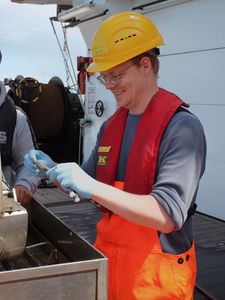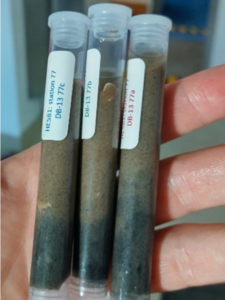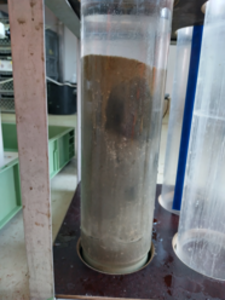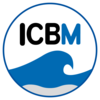Microbial Biogeography & Bottom Trawling
Background
Marine sediments are colonized by microbes, which support fundamental ecosystem functions. By degrading the detritus that is deposited on the seafloor, microbes play a key role in the decomposition of organic matter, and impact the elemental cycles. Relatively little is known about the drivers and processes that shape the benthic microbial biogeography (the abundance and distribution). Besides natural drivers such as sediment type, hydrology and organic matter that likely influence the sediment microbiota, human activities may impact the benthic microbial biogeography as well. This includes bottom trawling, which is a fishing practice that reworks sediments and has affects the benthic environment. The North Sea is one of the most heavily trawled regions on our planet, but whether trawling has altered the abundance and distribution of microbes is unknown. Recently, marine protected areas (MPAs) have been instated in the German Natura 2000 zones in the North Sea, where bottom trawling is excluded. Potentially, these areas may undergo benthic microbial shifts as a result of this management strategy, which would be important to document in order to learn how MPAs may influence the microbial biogeography and what the consequences of such changes are to ecosystem services such as the cycling of elements.
Project Aims
The general aim of this research project is to learn how bottom trawling activity in the North Sea affects benthic microbial patterns, and to better understand what the consequences of trawling effects on benthic microbiota are for the ecosystem. We use DNA based approaches (16S rDNA metabarcoding) to characterize microbial communities across the German North Sea and evaluate with statistical modeling approaches how benthic microbial patterns are shaped by the environment and bottom trawling activity. The specific objectives of the project are to (1) develop a benthic microbial monitoring program, (2) build a benthic microbial bio-archive, (3) evaluate what the main drivers are that shape the regional scale benthic microbial biogeography in the German North Sea, and (4) document and analyze changes within the MPAs (before and after) and between protected and non protected areas.
Funding
The project is funded by the Deutsche Allianz Meeresforschung (DAM) through the Bundesministerium für Bildung und Forschung (BMBF) and is carried out within the interdisciplinary research project MFG Nordsee and the research mission ‚Protection and Sustainable Use of Marine Areas’ (sustainMare).

ICBM Benthic Microbial Bio-archive
To evaluate how microbial properties change in response to fisheries exclusion, comprehensive samplings are needed that are carried out over multiple years, within and outside MPAs and at relevant spatial scales. While such monitoring datasets are valuable, it requires extensive effort. To make optimal use of the sampling conducted in this project, and potentially be of additional value to future studies we have created a bio-archive where samples of all visited locations are deposited.





